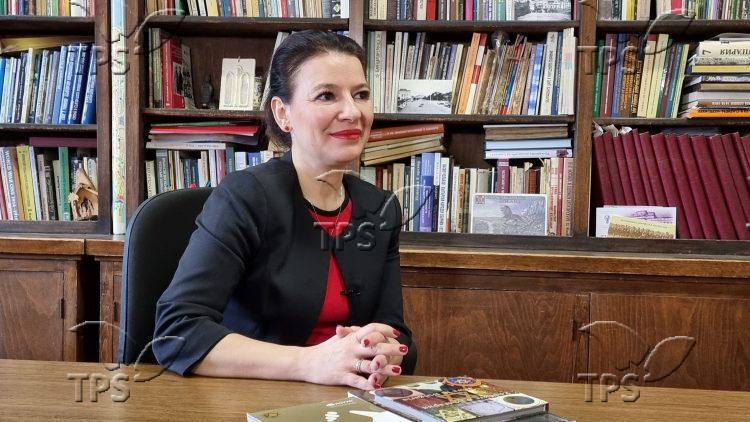Assoc. Prof. Christidi: Rescue of Bulgarian Jews Was Not One-time Act, but Continued Process for Over 3.5 Years
Jerusalem, 19 January, 2023 (TPS-IL) -- SOFIA, 19.01.2023 (BTA)
This year will mark a significant anniversary – 80 years since the rescue of the Bulgarian Jews – a great national capital that Bulgaria owns and owes to its predecessors from the time of World War II. The topic opens up many historical and historiographical questions and discussions for historians and society about who the rescuers were, what made this great humanitarian act possible and why it happened in Bulgaria, Assoc. Prof. Rumyana Marinova – Christidi, PhD, said in a BTA interview.
The Bulgarian News Agency (BTA), in partnership with the Alef Jewish-Bulgarian Cooperation Center, set itself the task of answering these questions with the help of prominent scholars, public figures, and experts on the subject with a series of articles to recall the events of the past and the participants in them, and to present the importance of the rescue and the rescuers. Bulgaria and Denmark are believed to be the only countries that did not allow their Jewish citizens to be deported to Nazi death camps. Nearly 50,000 lives were saved in Bulgaria.
BTA’s first interview is with Assoc. Prof. Dr. Rumyana Marinova-Christidi, who heads the Hebrew Studies Department at the Faculty of History of St. Kliment Ohridski University of Sofia, author of monographs, articles, studies and history textbooks, and lecturer in modern Bulgarian history. She is a member of the Bulgarian delegation to the International Holocaust Remembrance Alliance and the European Association for Jewish Studies. She has specialized at the International School for Holocaust Studies at Yad Vashem, where she is also certified to teach the Holocaust.
The big question that has no clear answer, is about the rescuers of Bulgarian Jews, who they were and how the rescue was made possible, said Christidi. She argued that the salvation cannot be nationalized or privatized. “We can only list some of the names of the rescuers without claiming to be exhaustive,” she said.
If we still have to answer the question who is the big rescuer of the Jews in Bulgaria, it is the Bulgarian people, she said. The majority of the public figures back then and many ordinary people by their behavior also gave an “excuse” to Tsar Boris III, to the Church, to Parliament Deputy Chair Dimitar Peshev and to the other rescuers to defy the orders for deportation of the Jews.
The rescue of the Bulgarian Jews is not a one-time act, it is a movement for protecting them over the course of three-and-a-half years, said Prof. Christidi. She argued that if the general population of a country allied with Nazi Germany, with anti-Jewish legislation, with an adopted agreement for the immediate deportation of its Jews, was anti-Semitic or wanted to get rid of its Jews, then that would have inevitably happened. “The exact opposite happened in Bulgaria: no one perished for being a Jew over the course of three-and-a-half years in these conditions,” the historian stressed.
As a scholar, Prof. Christidi believes that Jews have always been part of the Bulgarian people and State and have never been hated in this country. The Bulgarian patriarchal society, which was 80% agrarian during World War II, carries a strong patriarchal morality and is an infallible barometer of good and evil. Therefore, if in peaceful times the Bulgarian people were rather indifferent to the Jews, accepting them simply as a part of them, in times when their lives were threatened for no reason, the historically formed high human morals and humanism of the Bulgarians, their innate sense of justice – for good and for evil – came into play. That one should not cause evil to someone who does not deserve it, said Prof. Christidi.
In her words, Bulgarians are very tolerant when it comes to different religions and ideologies. They have never hated people for their race, religion and ethnicity. For centuries, they have coexisted with various ethnicities, religions and nationalities. The Bulgarian people themselves have never been fanatically religious and religion cannot be a reason for them to hate anyone, the scholar said. She described Bulgarians as tolerant. “They may be intolerant in everyday life, in their everyday behavior towards each other, but religion, race, ethnicity have never been a reason for resentment or hatred,” she said.
For the celebration of the 80th anniversary of the rescue of the Bulgarian Jews, a national plan has been prepared under the auspices of Bulgarian President Rumen Radev, which includes a number of events, said Prof. Christidi. “In March, when we mark this anniversary, an international conference will take place at Sofia University, dedicated to the lawyers who saved the Bulgarian Jews, organized jointly with the Embassy of the State of Israel, the Ministry of Foreign Affairs, the Association of Prosecutors, the Chamber of Investigators and with the support of the Federation of Zionists in Bulgaria,” the historian said. It will be a very interesting conference, with a variety of topics and reports, said Prof. Christidi. She also announced another forthcoming initiative – the unveiling in September in Sofia of a monument to the lawyers, who were rescuers, a major and timely initiative of the Association of Prosecutors and the Chamber of Investigators. Currently, work is underway on the construction of the monument, which will be something unique for Bulgaria, she added.


